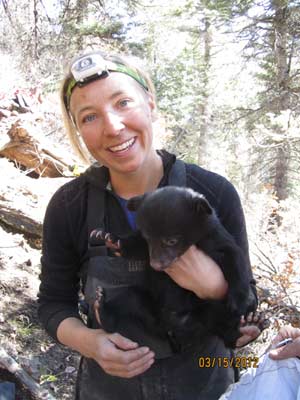 Colorado Parks and Wildlife (CPW) biologist Heather Johnson recently gave an interim report on her five-year black bear study to the state Parks and Wildlife Commission, the Durango Herald reports.
Colorado Parks and Wildlife (CPW) biologist Heather Johnson recently gave an interim report on her five-year black bear study to the state Parks and Wildlife Commission, the Durango Herald reports.
According to the CPW website, the study is intended to gather more information about the increase in conflicts between black bears and humans in the state. Does the increase reflect black bear population trends, or a change in behavior? To that end, the website says, the study:
1) tests management strategies for reducing bear-human conflicts, including a large-scale treatment/control urban-food-removal experiment; 2) determines the consequences of bear use of urban environments on regional bear population dynamics; 3) develops population and habitat models to support the sustainable monitoring and management of bears in Colorado; and 4) examines human attitudes and perceptions related bear-human conflicts and management practices.
One and a half years in, Johnson has found that female black bear behavior of the 51 collared bears she tracks is highly variable. One collared female never left a three block area in Durango, another wandered for 200 miles.
Up next is an experiment comparing conflicts in an area with bear-proof trash cans to one without the cans. That experiment will begin in the spring.
Read more about the study in the Durango Herald, here.
Read brief discriptions of CPW’s black bear research, here.
Photo: Heather Johnson, courtesy Colorado Parks and Wildlife.
